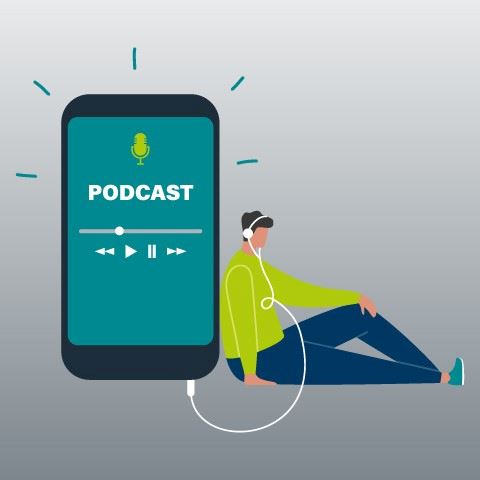
Navigating the rise of technology in construction
In this article we’ll dive into the booming world of smart construction technology, exploring the innovations driving the change and what the future looks like for the industry.

Audio-based content – and specifically podcasting – has been growing in popularity over the past few years. Since 2020, there were over 15 million recorded podcast listeners in the UK alone. This audience is estimated to grow to a staggering 20 million in just three years’ time. For this reason, among many others, businesses are beginning to utilise the benefits of podcasts.
A word of caution, however: creating a successful, meaningful podcast – and sustaining success – requires planning, preparation and commitment. But don't fret – that’s where we can help.
In this article we'll equip you with a range of practical advice to help you get your podcast off the ground, achieve standout, and gain a loyal audience. All of which can contribute to increased brand awareness and even improved sales.
Quite simply, first and foremost decide what you want your podcast to be about. Do some audience research and find out what your target demographic is most interested in and how that relates to your own business. This will help you decide what issues your podcast should cover and how you should cover it.
With that decided, you then need to establish how you want your podcast to look, sound and run. The 'feel' of your podcast should create an impression amongst your audience that best reflects your business and its aims. (Editing and production is important here, but more on that later.)
Choosing a podcast host is central to realising your vision. Your host should be an expert in your industry, your business, and the objectives you're working toward. They should also be passionate – this passion will really come across to your listeners. Knowledge combined with passion will help carry conversations and put your guests at ease. (More tips on how to host a podcast to come.)
Finally, bear in mind that your podcast doesn't necessarily have to be flawlessly slick. Your audience doesn't want to feel as though they're being lectured to. In some ways, this is what makes podcasts unique and different from more 'traditional' media (such as webinars). Podcasts can lend themselves to a more informal approach and – within reason – there's more conversational leeway. Rather than what feels like a scripted seminar, listeners are more likely to warm to a thoroughly prepared yet informal podcast.
Format and frequency
Your podcast’s format is something else that must be considered during the planning stages. Consistency is key here. Firstly, what type of podcast is going to work best for your business and its aims? Is it an interview podcast (i.e. The Joe Rogan Experience), a news recap (i.e. The Daily), or an educational podcast (i.e. TED Radio Hour and Stuff You Should Know)?
Then think about how you would like your podcast to be structured. This typically means breaking your episodes into a number of segments that remain a constant throughout all your episodes. Decide what you want each segment to cover, how long you want each one to last for, and how you want them to sound. Cementing this structure will not only provide consistency for the listener but help keep discussions on track.
Remember: while topics and content throughout a podcast series will of course change, an audience will grow loyal to audio content that's consistent and familiar. Having a structure in place limits the chance of a conversation drifting – something which could potentially turn listeners away.
The desired length of each of your episodes is also something to consider. The optimal length of a podcast is widely debated within the podcasting community. Some prefer short, sharp 30-minute (or even 15-20-minute episodes). Some aim for an hour. Others let the conversation continue until it reaches its natural conclusion. There is no right answer.
The reality is that audiences will almost certainly dip in and out of episodes and listen to them while they're doing other things (shopping, commuting, exercising etc.) – that's the beauty of podcasts! Have a time limit to aim toward, but don't burden yourself with it too much. If what you're covering is complex and wide-ranging, then consider a longer podcast. If your subject matter lends itself to short, sharp, impactful content, then a shorter podcast may be right for you. What's important is that the content remains interesting and engaging – your podcast should be as long as it needs to be, without being any longer.
Before recording consider how frequently you want to (and can) release episodes. Of course, the more frequent the episodes the more quickly you're likely to develop a connection with your audience. Audiences build loyalty to a brand and podcast that is consistent – both in its quality and frequency. Regardless of whether your episodes are weekly, monthly or quarterly you must remain consistent.
Creating a publishing schedule in advance – including guests and subject matter – can help with this. Ample time between recording and publishing to review, edit and promote should also be allowed.
Branding
This is important. Really think about how you want your podcast to sound and look and what impression you want to give your audience. The purpose of your podcast should be instantly recognisable. For example, simply naming your podcast ‘The Business Podcast’ or ‘[INSERT BRAND NAME] talks’ will not set you apart or engage an audience. There are thousands of business-related podcasts out there to choose from. What does your podcast do that makes it unique? Why should your audience care? What will they get from it? Brand your podcast in such a way that answers these questions instantly and emphatically. This counts for imagery as well as wording. Your podcast needs to stand out against the myriad other competing podcasts so make sure your logo and episode artwork grab attention and convey your desired message.
The same advice applies when naming individual podcast episodes and drafting episode descriptions. Be mindful of keywords. While you don't want to shoehorn keywords into your episode titles, you do want to make it easy for people to find them.
All the gear…
Once you have your podcast format, approximate length, publishing schedule, and branding sorted, you're ready to invest in equipment. You don't need to break the bank to run a successful podcast. Remember, your content is the most crucial part and people will put up with less-than-optimal sound quality if the content of your show is excellent.
What you do need to ensure, however, is that your content isn't compromised by poor equipment. Quality content and interesting, salient points can be lost because of poor audio/audio distortion. As such, we would recommend (initially) an entry-level equipment/software package. This typically includes:
Once you've recorded your podcast, it's time to make edits and adjustments to get the best content and sound quality possible. There are of course options to edit your podcast on your Android or iPhone devices, but their small screens aren't optimal for sound editing. The great news is, however, that podcast editing software can be surprisingly affordable. Some examples below:
There are also platforms dedicated to the distribution of podcasts such as Buzzsprout and Podbean.
In-person discussions can help to build rapport between host and guest, and improve audio quality. It's inevitable, however, that some of (if not all) your episodes will be long-distance recordings. This means using software specifically made for long-distance recordings. Anchor (as mentioned above) allows you to record and edit podcasts. Zoom has become one of the go-to online interview platforms for podcasting, primarily because of its above-average audio quality and ease-of-use for remote podcast interviews. Lots of podcasters still use Skype to record long-distance interviews, although it lacks audio quality, there's no elegant recording set up (you can't save call audio, only a mixed down MP4), and if your internet connection isn't fast enough, you can run into serious sound issues.
We’ve pulled together six helpful tips to keep in mind.
1. Consistency. Your audience will become attached to the host and begin to build a rapport with them as your podcast progresses. This shouldn't be interrupted unless it's absolutely unavoidable.
2. To script or not to script… While you do not want your podcast to sound as though the host is reading from a teleprompter, they do need a running order, questions (and potential follow-up questions) and salient points, facts and figures in front of them. Having a thoroughly researched and prepared podcast that isn't scripted word-by-word can improve the quality of content while still allowing room for spontaneity and informality.
3. Share the spotlight. A podcast host needs to be a good multi-tasker. They need to actively listen to what they're being told and how they could respond while also thinking two steps ahead to what questions and/or segments are coming up. They need to be thinking: What's the next section on my running order? What potential follow-up questions can I ask to the point they're making? Is there a point they've made that needs elaborating/clarifying? Can I add anything to the point they're making?
The host can't just ask a series of questions one after the other – they also need to be a mediator and conversationalist. They should know when to pause and elaborate on certain points and topics, and when to move onto the next question/section. They need to be aware of rants or any rambling and use their skills to tactfully move the conversation on.
The host should also be able to provide insight themselves and reply appropriately to guests' points without taking the limelight away from them. They should make valuable contributions without dominating the conversation.
4. Be wary of audible active listening. While it's tempting (and natural) to utter sounds of agreement or reassurance while listening to guests, try to avoid it. Microphones can pick up the faintest of sounds which can sound odd and make editing tricky.
5. Always have an eye on the editing process. Be constantly aware of things like connection cut-outs or conversational errors (i.e. moving on to the wrong segment or asking a question incorrectly). Call the podcast to a halt, re-ask the question and/or re-do the link. This can make the editing process much more straightforward.
6. Build a rapport. Speaking with guests in the days and weeks leading up to recording will build a rapport and help them feel more comfortable once you hit record. You also want to ensure they're prepared. Like the host, you should discourage guests from scripting answers, but they do need time in advance to consider your questions and formulate answers.
Marketing your podcast may seem like a daunting task, but it doesn't have to be. Remember: your marketing strategy should look much the same as it would do for any other type of media. After all, a podcast is just another piece of content so promote it accordingly: social media posts, advertising, news bulletins etc. While recording your podcast be on the lookout for content to promote it – post behind the scenes pictures, publish small teaser posts etc. Also encourage your guest – and their company – to market their episode. This will help broaden your reach.
The key to maintaining success is to constantly evaluate and improve. Before you begin, try to pin-point what a successful podcast would look like for you. Is it about brand awareness, lead generation, or establishing your business as an industry thought leader? Decide what it is, establish KPIs and measure yourself against them.
Many podcast hosting and/or recording platforms will offer a range of helpful analytics, including drop-off times, average listening times and demographic reach. Understanding these analytics – and how to improve upon them – will help develop your podcast. Use them to guide you and don’t be afraid to tweak elements of your podcast (within the parameters of your pre-defined format and structure). For example, you may notice that people stop listening at the beginning of a certain segment, so consider shortening or removing it. Your listener demographic may be heavily skewed toward men/women, certain countries, or people of a certain age. If that isn't the right demographic for you, then things need to change. You may need, for example, older/younger male/female guests, slightly different subject matter, or to change how you promote the podcast.
When evaluating success it's important to remember that podcasts are longer-form content, so don't compare 150 listeners with 10,000-plus impressions on a social media post. The two don't compare – one requires a quick glimpse mid-scroll, the other 40-plus minutes of commitment, so manage your expectations accordingly.
Podcasts can be an extremely useful marketing medium if done well. From establishing your expertise in a chosen field to raising brand awareness, it’s a great way to build audience loyalty.
Establish your podcast's purpose, answer the "why should our audience care?" question, prepare thoroughly and choose your host and guests wisely. This is, however, just the start. What will sustain your podcast's success will be the quality of the content and your business’s commitment to the medium.
If you're interested in getting your podcast off the ground, contact Principal Director, Rachel Arquati: r.arquati@clearb2b.com / 01285 626000.



In this article we’ll dive into the booming world of smart construction technology, exploring the innovations driving the change and what the future looks like for the industry.

Learn how to use presentation opportunities as an effective lead-generation tool in your trade show activity.

Great marketing success comes from keeping your communications focused, engaging and simple to ‘get’ - but that isn’t always so simple to achieve.

With multiple types of technologies being considered, we bring you a snapshot of alternative fuels and review the most prominent pros and cons for each one.